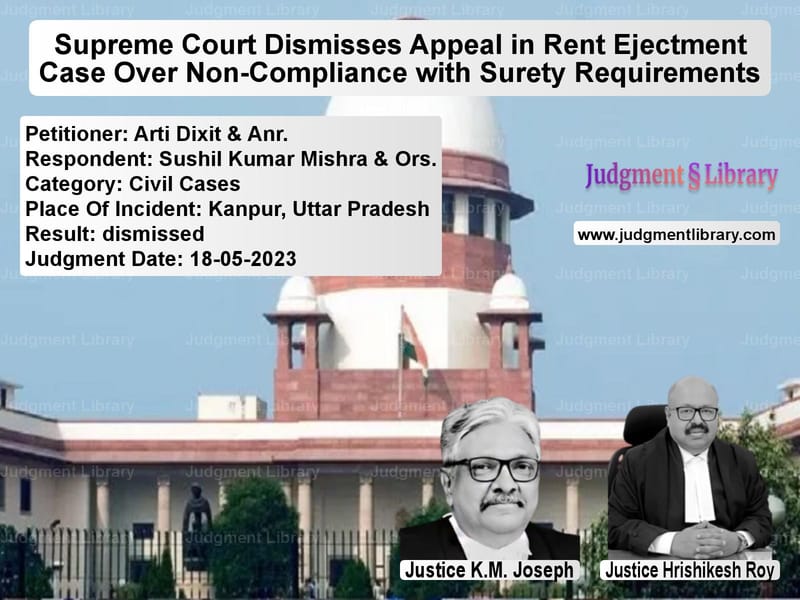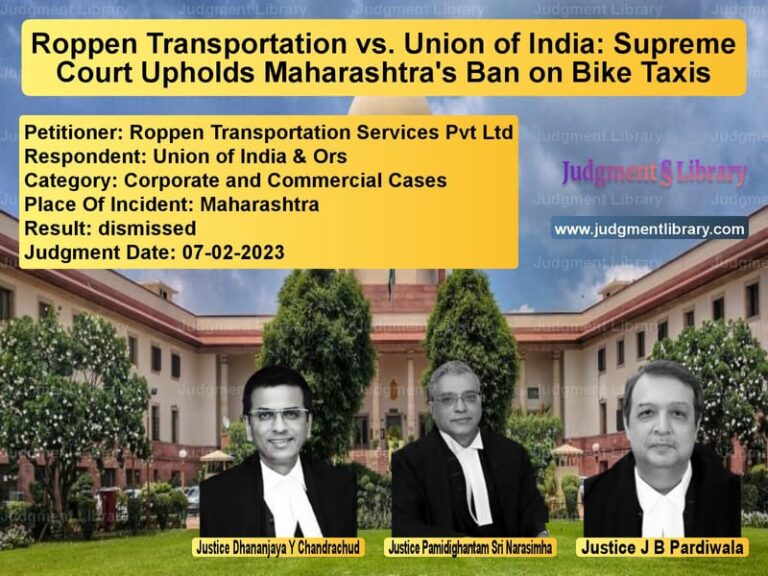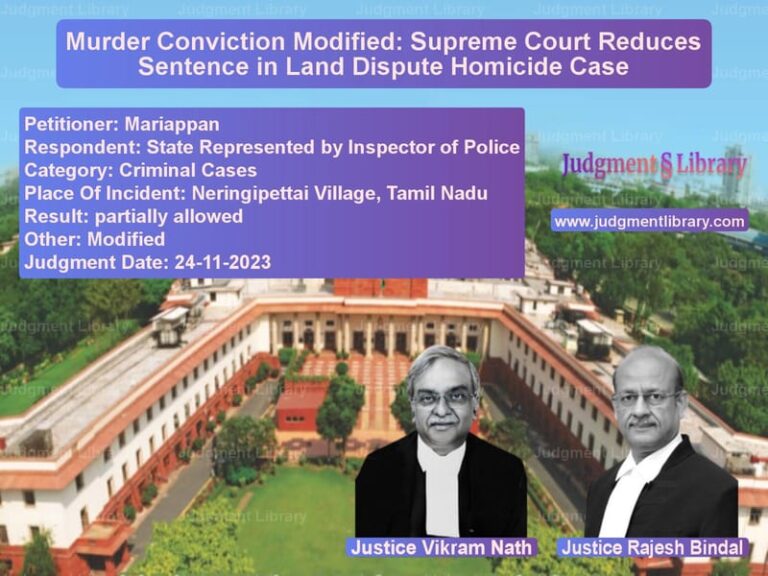Supreme Court Dismisses Appeal in Rent Ejectment Case Over Non-Compliance with Surety Requirements
The Supreme Court of India recently delivered a crucial verdict in a case concerning the non-compliance of security provisions under the Provincial Small Cause Courts Act, 1887. The dispute involved an ex-parte decree for ejectment and recovery of arrears of rent, taxes, and damages, which the appellants, Arti Dixit and another, sought to set aside. However, the Supreme Court upheld the lower courts’ decisions, ruling that the appellants failed to fulfill the mandatory requirements under Section 17 of the Act.
Background of the Case
The respondents, Sushil Kumar Mishra and others, obtained an ex-parte decree against the appellants on October 18, 2012, for ejectment and recovery of dues. The appellants claimed they became aware of the decree only on April 5, 2014, during execution proceedings. Subsequently, on May 6, 2014, they filed an application under Order IX Rule 13 of the Code of Civil Procedure (CPC) to set aside the ex-parte decree and another application under Section 17 of the Provincial Small Cause Courts Act, 1887.
Section 17 of the Act mandates that an applicant seeking to set aside an ex-parte decree must either deposit the amount due under the decree or provide security for its performance. The appellants, while submitting their application under Section 17, sought permission to furnish security instead of depositing the full amount.
Arguments Presented
Petitioners’ Arguments
The petitioners, represented by counsel, made the following claims:
- Their application under Section 17 was filed alongside their application under Order IX Rule 13, which complied with legal requirements.
- The trial court failed to pass any order on their Section 17 application, which should not have been held against them.
- On May 12, 2014, they filed another application (14C) to furnish security in the form of a rental shop owned by the municipal corporation, arguing that the court accepted the security on May 24, 2014.
- Since the security was accepted, any insufficiency found later should not be held against them.
Respondents’ Arguments
The respondents countered with the following arguments:
- The appellants failed to deposit the amount due or furnish valid security at the time of filing their application under Section 17, making their plea legally non-compliant.
- The security furnished (a rented shop) was not legally acceptable, as the shop was owned by the municipal corporation and could not be attached or sold under Section 145 of the CPC.
- The appellants were aware of the requirements of Section 17 but failed to provide valid security within the prescribed time limit.
- Their subsequent application to submit security was an afterthought and was legally inadequate.
Supreme Court’s Judgment
The Supreme Court, after reviewing the case, dismissed the appeal, agreeing with the findings of the lower courts. The key observations of the court included:
- “The requirements under Section 17 of the Act are mandatory, and the failure to comply renders the application under Order IX Rule 13 incompetent.”
- “The security provided by the appellants—a shop owned by the municipal corporation—was not legally enforceable and could not be accepted as valid security.”
- “The lower courts correctly held that the appellants had not complied with the mandatory deposit or security requirements within the prescribed time.”
- “The claim that the trial court failed to pass an order on their application does not absolve the appellants from their obligation to comply with the provisions of the law.”
- “The High Court was correct in rejecting the appellants’ plea and upholding the lower courts’ orders.”
Legal Implications of the Judgment
The Supreme Court’s decision reinforces the following legal principles:
- Strict Compliance with Section 17 of the Act: Any party seeking to set aside an ex-parte decree under the Provincial Small Cause Courts Act must ensure compliance with security or deposit requirements at the time of filing their application.
- Security Must Be Legally Enforceable: The court clarified that security provided must be enforceable under law, meaning assets offered as security must be attachable and sellable in case of default.
- Failure to Act Timely Can Be Fatal: The ruling underscores that procedural delays or failures by the applicant, even if partly attributable to the court, cannot excuse non-compliance with statutory provisions.
- Binding Precedents Apply: The court reiterated its earlier ruling in Kedarnath v. Mohan Lal Kesarwari, which held that failure to meet Section 17 requirements renders an application under Order IX Rule 13 untenable.
Conclusion
The Supreme Court’s ruling in this case sets an important precedent in rent ejectment and procedural compliance matters. By upholding the mandatory nature of security and deposit requirements under Section 17 of the Provincial Small Cause Courts Act, the judgment reinforces the principle that litigants must strictly adhere to statutory provisions while seeking relief.
For future litigants, this decision serves as a clear reminder that procedural compliance is critical in legal proceedings. Any failure to meet statutory conditions, even if partially due to judicial delay, can result in dismissal of their plea. This judgment is likely to be referenced in future cases dealing with similar issues of procedural non-compliance in ex-parte decree matters.
Petitioner Name: Arti Dixit & Anr..Respondent Name: Sushil Kumar Mishra & Ors..Judgment By: Justice K.M. Joseph, Justice Hrishikesh Roy.Place Of Incident: Kanpur, Uttar Pradesh.Judgment Date: 18-05-2023.
Don’t miss out on the full details! Download the complete judgment in PDF format below and gain valuable insights instantly!
Download Judgment: arti-dixit-&-anr.-vs-sushil-kumar-mishra-supreme-court-of-india-judgment-dated-18-05-2023.pdf
Directly Download Judgment: Directly download this Judgment
See all petitions in Landlord-Tenant Disputes
See all petitions in Damages and Compensation
See all petitions in Contract Disputes
See all petitions in Property Disputes
See all petitions in Specific Performance
See all petitions in Judgment by K.M. Joseph
See all petitions in Judgment by Hrishikesh Roy
See all petitions in dismissed
See all petitions in supreme court of India judgments May 2023
See all petitions in 2023 judgments
See all posts in Civil Cases Category
See all allowed petitions in Civil Cases Category
See all Dismissed petitions in Civil Cases Category
See all partially allowed petitions in Civil Cases Category







